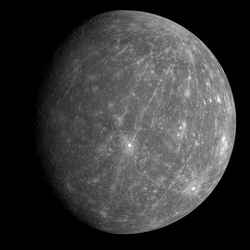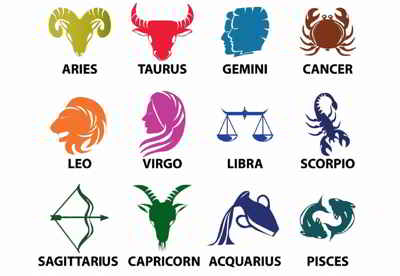Western Astrology: Classical Planets: Mercury
Mercury is the ruling planet of Gemini, the sign that governs the 3rd house in the natural zodiac, and over the 6th
house sign of Virgo and is exalted in the latter; it is the only planet with rulership and exaltation both in the same sign (Virgo).
The seven classical planets are those easily seen with the naked eye, and were thus known to ancient astrologers. They are the Sun, Moon, Mercury, Venus, Mars, Jupiter and Saturn.
Mercury is the closest planet to the sun. It is an iron rock with both extremely hot and extremely cold temperatures. This planet is always in either the same sign as the sun or the one right next to it. Mercury's sign indicates how we communicate with others and how true we are to ourselves and to the world. Mercury was the right hand of God, or the Sun, in Greek mythology. Sometimes Mercury was represented by a good twin and bad twin. If Mercury is predominant in your current horoscope or birth chart, you will tend to be more communicative. When Mercury appears to move backward through the sky, there tend to be interruptions and delays in travel, business, technology and communications. As Mercury retraces its steps, you may find that delays work to your advantage while you sort out old issues by revisiting old territory. Mercury rules both the Sign of Gemini and the Virgo Sun Sign. This planet begs us to express ourselves often and well. Mercury takes about eighty eight days to complete its orbit of the sun.
Western Astrology: Classical Planets: Mercury
Mercury |
|

Mercury, the messenger of the gods, governs communication - how you relate to others and how others hear you and is noted for his speed and swiftness.
Mercury is the smallest and closest to the Sun of the eight planets in the Solar System, with an orbital period of about 88 Earth days. Echoing this, the scorching, airless world Mercury circles the Sun on the fastest orbit of any planet.
Distance from Sun: 35,980,000 miles
Radius: 1,516 miles
Mass: 328.5E21 kg (0.055 Earth mass)
Length of day: 58d 15h 30m
Orbital period: 88 days spending about 7.33 days in each sign of the zodiac.
Gravity: 3.7 m/s2
The apparent daily motion of this very small planet is of one degree on average, similar to the Sun's. Mercury never moves further than 28 degrees
away from the Sun, when viewed from the Earth. Mercury is so close to the Sun that only a brief period exists after the Sun has set where it can be
seen with the naked eye, before following the Sun beyond the horizon.
Astrologically, Mercury represents the principles of communication, mentality, thinking patterns, rationality and reasoning, and adaptability and variability.
Mercury governs schooling and education, the immediate environment of neighbors, siblings and cousins, transport over short distances, messages and
forms of communication such as post, email and telephone, newspapers, journalism and writing, information gathering skills and physical dexterity.
The 1st-century poet Manilius described Mercury as an inconstant, vivacious and curious planet.
In medicine, Mercury is associated with the nervous system, the brain, the respiratory system, the thyroid and the sense organs. It is traditionally
held to be essentially cold and dry, according to its placement in the zodiac and in any aspects to other planets.
In modern astrology, Mercury is regarded as the ruler of the third and sixth houses; traditionally, it had the joy in the first house. Mercury is the
messenger of the gods in mythology. It is the planet of day-to-day expression and relationships. Mercury's action is to take things apart and put them
back together again. It is an opportunistic planet, decidedly unemotional and curious.
Rules Day of the Week: Wednesday
Wednesday is ruled by Mercury. "Wednesday's child is full of woe" might be interpreted as a person who worries or thinks too much. Mercury is the thinking planet, the intellectual planet, and one that is skilled in communicating. Mercury also rules short journeys and transportation. Wednesday's child then is going to be highly gifted intellectually, but may worry a little too much as being ruled by Mercury may mean they wind up being a little too lost in their thoughts on occasion.
Mercury rules over Wednesday. In Romance languages, the word for Wednesday is often similar to Mercury (miercuri in Romanian, mercredi in French, miercoles in Spanish and mercoledì in Italian). Dante Alighieri associated Mercury with the liberal art of dialectic. In Indian astrology, Mercury is called Budha, a word related to Buddhi ("intelligence") and represents communication.
Chinese Astrology
In Chinese astrology, Mercury represents Water, the fourth element, therefore symbolizing communication, intelligence, and elegance.





